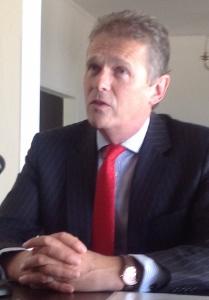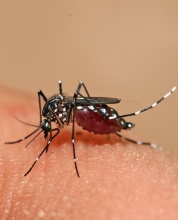Archive for August 1st, 2013

Crisis Centre fundraiser brings in US bestseller
 (CNS): A leading US author who is a domestic abuse survivor will be the keynote speaker at a fundraising event for the Cayman Islands Crisis Centre next month. Leslie Morgan Steiner is the author of Crazy Love, her bestselling memoir about surviving domestic violence in her first marriage, and a columnist for The Washington Post. She will discuss why people living in violent relationships stay and why it isn’t fair to judge the victims. The fundraiser will take place at the Ritz Carlton at lunchtime on Friday 13 September. Tickets cost $100 and all proceeds will go towards the Crisis Centre, which is the only safe haven in the Cayman Islands for women and their children who are in abusive and dangerous situations.
(CNS): A leading US author who is a domestic abuse survivor will be the keynote speaker at a fundraising event for the Cayman Islands Crisis Centre next month. Leslie Morgan Steiner is the author of Crazy Love, her bestselling memoir about surviving domestic violence in her first marriage, and a columnist for The Washington Post. She will discuss why people living in violent relationships stay and why it isn’t fair to judge the victims. The fundraiser will take place at the Ritz Carlton at lunchtime on Friday 13 September. Tickets cost $100 and all proceeds will go towards the Crisis Centre, which is the only safe haven in the Cayman Islands for women and their children who are in abusive and dangerous situations.
The goal of the fundraiser is to raise awareness about domestic violence in all levels of society and to let people know how they can get help.
See flyer below for more details.

CS needs accountability
 (CNS): The departing Cayman Islands governor said that his biggest regret regarding the job he held for more than three and a half years was not advancing the problem of accountability in the civil service as far as he had hoped. Duncan Taylor admitted that there is a problem in the local public sector in that there are no real consequences for non-performance as it has taken a long time to get a proper assessment process in place. Less than one week from his departure, the governor said he regretted that he could not have done more to move this issue forward because other members of the civil service are forced to “pick up the slack” from those who are not performing as they should.
(CNS): The departing Cayman Islands governor said that his biggest regret regarding the job he held for more than three and a half years was not advancing the problem of accountability in the civil service as far as he had hoped. Duncan Taylor admitted that there is a problem in the local public sector in that there are no real consequences for non-performance as it has taken a long time to get a proper assessment process in place. Less than one week from his departure, the governor said he regretted that he could not have done more to move this issue forward because other members of the civil service are forced to “pick up the slack” from those who are not performing as they should.
Speaking to the press formally for the last time before he leaves the islands for his new post in Mexico, Taylor said the appraisal system is now taking shape and he commended Deputy Governor Franz Manderson for his strategic vision on this issue. Nevertheless, with the appraisals only just beginning, Taylor warned it would take time for them to gain credibility and it was not until there was “a robust and fair system” of appraisals in place that consequences, such as dismissing people, could be built into the system.
He said that the appraisals would create a credible means to address poor performance, which could eventually mean that civil servants would lose their jobs if they did not meet the expected mark, but strong appraisal system would also be used to advance and promote good performers. The process had taken a lot more time than he had hoped, he said, but expressed his confidence that now it had begun it would soon advance the accountability which was needed and which, he emphasised, was very important.
Taylor also noted that the size of the civil service itself, which has been a topical issue in recent months, was not as important as its efficiency. He said that, overall, government was going in the right direction in terms of headcount as a result of the natural attrition. By the end of this year there would be at least 60 less people on the core government payroll, he added, but warned the problem area was statutory authorities and government companies (SAGCs).
Taylor said the new government had undertaken to look at this issue and see if some mechanism could be introduced to control recruitment in the SAGCs. The government was still targeting a 10% reduction in overall headcount without job losses by not always filling vacancies when people left the service, he said.
Despite pressure from the UK to reduce operating costs, Taylor warned that government should think hard before privatizing parts of the civil service because wherever government services were privatized, there needed to be a strong regulator. This would not necessarily be possible in such a small jurisdiction and what government might save in privatization could be lost in trying to oversee private sector service providers. He warned government to think long and hard about what it wanted to achieve through privatization and whether it would be beneficial in the long run.
The goal, he said, was to have a government that delivered the services that the community needs and wants efficiently and cost effectively.
Check back to CNS for more from the governor's parting press briefing.

ICO throws book at CINICO
 (CNS): The Information Commissioner's Office (ICO) has described the government’s health insurance company’s approach to the freedom of information law as "appalling" and accused the government company of violating both the spirit and the letter of the FOI law. Commissioner Jenifer Dilbert has made a number of directions that the Cayman Islands National Insurance Company (CINICO) must now follow to improve its understanding and application of the law, as this is the second time it has repeatedly contravened the FOI law during an appeal. In this case, not only did CINICO fail to provide a decision within the statutory 30 days but it also refused to say why it was refusing an applicant full access to board minutes.
(CNS): The Information Commissioner's Office (ICO) has described the government’s health insurance company’s approach to the freedom of information law as "appalling" and accused the government company of violating both the spirit and the letter of the FOI law. Commissioner Jenifer Dilbert has made a number of directions that the Cayman Islands National Insurance Company (CINICO) must now follow to improve its understanding and application of the law, as this is the second time it has repeatedly contravened the FOI law during an appeal. In this case, not only did CINICO fail to provide a decision within the statutory 30 days but it also refused to say why it was refusing an applicant full access to board minutes.
In her 33rd decision since the FOI law came into force, Dilbert has used the law to throw the proverbial book at the public authority for its multiple and repeated violations of the law and is failure to cooperate with her office.
The case began with a simple request on11 February this year for a copy of the CINICO Board minutes of 30 January. The request was acknowledged within the statutory 10 calendar days, but only after being prompted by the applicant. However, on 21 March the information manager refused the request, saying the minutes had not yet been approved. The applicant asked for an internal review and the CEO released redacted minutes on 15 April, stating that the redaction was made under "section 21(1)(a)(b)” of the law, which does not exist, and gave no explanation why.
As a result, on 16 April the applicant asked the ICO for an appeal. But even during the appeal, Dilbert said, CINICO continued to refuse to cooperate about its reasons until the eleventh hour when it said that the redaction was to protect a request for proposal (RFP).
“I note that CINICO’s approach violated both the spirit and the letter of the FOI Law, and was uncommonly unhelpful towards the ICO and the Applicant alike,” Dilbert stated in her decision. “Needless to say that CINICO’s actions fell far short of the expected mark. Even after several requests by the ICO, CINICO refused to cooperate with the ICO’s pre-hearing investigation; I can only find CINICO’s refusal to state the reasons for its decision clearly, as well as its stubborn rejection of the ICO’s pleas to communicate during the appeals process, appalling.”
The information boss pointed out that not only was there uncertainty for the applicant and for the integrity of the appeals process, but it was also an unacceptable and clear violation of the rights of the applicantto be told the reasons for withholding the redacted information. The law clearly expects that a public authority explains exactly why information is being withheld.
“CINICO did not communicate any lawful reasons for withholding the information in its initial decision, and quoted a non-existent section of the Law as the reason in its internal review. Therefore, CINICO did not meet its legal obligations,” Dilbert said, adding that the authority did not conduct a public interest test, in which the factors supporting withholding the information were balanced against the need for accountability and openness in government processes and decisions.
The refusal by CINICO to properly apply the law and their failure to cooperate caused significant issues, but Dilbert also stated that she struggled to find any justification for the redaction.
“As a result, I have no clear indication as to what commercial value the redacted information has and whether this could be destroyed or diminished in value if the information is disclosed, and, if so, how,” she explained, as she ordered the release of the un-redacted minutes.
Referring to a previous decision, where she had found that CINICO repeatedly contravened the provisions of the FOI law, she said the continued contraventions demonstrated a “lack of respect” for the FOI law as well as the policies and procedures of her office.
"It is therefore necessary for me to bring the full force of the Law to ensure compliance in future," Dilbert stated, as she listed the actions she expected CINICO to take over the next three months to put their FOI stall in order.
“I find that in the course of this request and appeal, CINICO has egregiously and wilfully failed to comply with the following sections of the FOI Law," and said these infractions took place on the heels of similar contraventions.
The commissioner said she was hampered in the investigation of this case by CINICO’s disregard for the law as well as the policies and procedures of the ICO.
Dilbert directed CINICO to disclose the responsive record in full and ordered that the senior management of CINICO attend her office for further training in dealing with freedom of information requests. Referring the board to what she said was the egregious and willful failure of the management to comply with its obligations under the law, she also recommended that the board meet with her to learn the statutory requirements which CINICO is subject to under the FOI law.
She said that CINICO should take the appropriate steps to bring it into compliance with the law and to advise her office within three months of the decision what steps have been taken to comply with the ICO requirements.
See the full decision below or go to www.infocomm.ky.

Cayman’s youth soccer players impress at Disney Cup
 (CNS): Over 70 up-and-coming Cayman soccer stars left their hearts on the field, participating in the famed Disney Cup International Youth Soccer Tournament in Orlando, Florida July 15-20th, 2013. This longstanding tournament attracts youth teams from over 20 countries internationally, including Canada, USA, Venezuela, Brazil and Costa Rica. Growing into one of the largest tournaments of its kind, U9 through U19 youth teams play on the world class ESPN Wide World of Sports Complex, located directly in Disney.
(CNS): Over 70 up-and-coming Cayman soccer stars left their hearts on the field, participating in the famed Disney Cup International Youth Soccer Tournament in Orlando, Florida July 15-20th, 2013. This longstanding tournament attracts youth teams from over 20 countries internationally, including Canada, USA, Venezuela, Brazil and Costa Rica. Growing into one of the largest tournaments of its kind, U9 through U19 youth teams play on the world class ESPN Wide World of Sports Complex, located directly in Disney.
With a unique opportunity for youngsters to play on professional fields and make it to the “big screen”, Cayman’s Academy Sports Club travelled to the prestige event to represent their country in the 5 day tournament.
With five boys teams participating from Cayman, U10, U12, U13, U15 and U16, Cayman was one of the largest contingents represented at the tournament. Head Coach Virgil Seymour was extremely pleased with the results from his players stating “it is with great pride I congratulate all our players on their success at the Disney Cup. In only our second year participating, the talent and dedication from the players was very impressive.”
The U10 team achieved the highest tournament ranking of their Cayman teammates, losing only in the Gold medal match to a team from Venezuela. All Academy Sports Club teams played in the Premier division, the highest level of the tournament, which is indicative of past performance. U10 Coach Paul Byles says “I am so pleased with the passion on the field displayed by the U10 players. Their attitude both on and off the pitch was a true reflection of their Caymanian roots, and I am looking forward to working again with this great group of kids.”
Byles also said the U12 team played very well in a large and tough group. The club is also very proud of their performance, they performed well in their group and we are looking forward to the next tournament", he added.
The U13s were runner-up in the Silver finals, U15s runner-up in Silver finals and U16s Gold Semi-finalists. Academy Sports Club coaches include Paul Byles (U10 and U12), Ken Downey (U13), Virgil Seymour (U15) and Glen Whewell (U16).
Ms. Seymour goes on to say “our success was possible from the combined efforts of the athletes, parents, volunteers and sponsors. Without the support and hard-work of all involved, Academy Sports Club wouldn’t have had the opportunity to show the world our talents on the pitch. Thank you for making this possible.”

Girls basketball squad in need of sponsorship
 (CNS): Coming off of a successful June training camp that Cayman's Women of Valour basketball squad attended at Nova Southeastern University, the team is preparing to send players to two more, but is in need of donations to make it possible. One of the organisors, Ray Doxey, is calling for sponsorships or scholarships for the athletes and siad they were hoping to be able to take at least 10 players from the Women of Valor squad to attend both of these camps.
(CNS): Coming off of a successful June training camp that Cayman's Women of Valour basketball squad attended at Nova Southeastern University, the team is preparing to send players to two more, but is in need of donations to make it possible. One of the organisors, Ray Doxey, is calling for sponsorships or scholarships for the athletes and siad they were hoping to be able to take at least 10 players from the Women of Valor squad to attend both of these camps.
First they will attend the Elite Camp II at Nova University on 3-4 August. A squad of five young ladies attended the Elite Camp I in early June, and had good feedback from the coaches. Doxey said it was important in the players' development to return to Nova to show the coaching staff there how much they have improved after their summer practices, gym and track workouts here in Cayman under the direction of Coach Redver and Coach Billy.
Next up would be the Palm Beach Atlantic & Elev8/Ganon Baker Elite Camp on 7-9 August. Doxey said that not only was this is an important development camp for the players but the exposure was also very important for recruitment into universities. One 16-year-old player already caught the attention of scouts at an earlier PBAU camp and has received a letter of interest from Penn State University, so exposing the players has positive results, he said.
In between camps, games between local Florida teams and Cayman's squad are being set up in attempts to spur development, training and exposure to meeting other like-minded athletes. The previous visit in June saw the girls also touring Cardinal Newman High School in West Palm Beach, which was led by the school principal, Dr Christine Higgins, who spoke to the team about athletics as well as the importance of being a well-rounded student and being involved in other school and community activities, which is what universities are looking for today.
"The squad is seeking sponsor/donations to make this trip a reality. Knowing the tough times we are all currently facing, fund raising has been tough. But seeing the young ladies develop and perhaps get some overseas scholarships (which would not cost the government anything) is something that is in all our best interest for the future," Doxey said.

Matches & groups fixed for CONCACAF tourny
 (CNS): Cayman will be taking centre stage later this month when hundreds of players and officials pour onto the islands for CONCACAF’s under 15 tournament. The local team will play all of their qualifying matches at the Truman Bodden Stadium with 7-30pm kick offs when the football competition starts on Tuesday 13 August. Cayman is drawn in group A and will need to beat out Aruba, Bahamas, St. Maarten, US Virgin Islands and Bermuda to secure the group’s top spot and qualify for the semi-finals and play the winner of group C in which both Honduras and Trinidad & Tobago are drawn.
(CNS): Cayman will be taking centre stage later this month when hundreds of players and officials pour onto the islands for CONCACAF’s under 15 tournament. The local team will play all of their qualifying matches at the Truman Bodden Stadium with 7-30pm kick offs when the football competition starts on Tuesday 13 August. Cayman is drawn in group A and will need to beat out Aruba, Bahamas, St. Maarten, US Virgin Islands and Bermuda to secure the group’s top spot and qualify for the semi-finals and play the winner of group C in which both Honduras and Trinidad & Tobago are drawn.
The tournament has been billed as a major coup for Cayman as along with some 800 players and officials the competition is also expected to attract hundreds more family, friends and fans who will be staying in Cayman for over two weeks.
The local football association is also still seeking volunteers from all walks of life to help out in what will be a major logistical operation for CIFA which is hosted the federation’s regional development tournament.
Cayman’s first match is on Tuesday 13 August at 7-30pm against St Marteen at the Truman Bodden Stadium in George Town. The first round matches are all free to enter but tickets for the semis and finals are $10 and $15 respectively.
See schedule below

Honduras under state of emergency over dengue fever
 (BBC): Honduras has declared a state of emergency after an outbreak of dengue fever which has killed 16 people so far this year. More than 12,000 people have been diagnosed with the disease, which causes high fever and joint pains. Officials say that in more than 1,800 cases, there is a risk of internal bleeding and death. The government has promised to step up its fight against the mosquitoes which spread dengue fever. Health Minister Salvador Pineda said more than half of Honduras' municipalities have registered cases of the viral infection this year. The worst outbreak of dengue in Honduras was in 2010, when 83 people died. According to the World Health Organisation (WHO), the incidence of dengue has increased 30-fold over the last 50 years.
(BBC): Honduras has declared a state of emergency after an outbreak of dengue fever which has killed 16 people so far this year. More than 12,000 people have been diagnosed with the disease, which causes high fever and joint pains. Officials say that in more than 1,800 cases, there is a risk of internal bleeding and death. The government has promised to step up its fight against the mosquitoes which spread dengue fever. Health Minister Salvador Pineda said more than half of Honduras' municipalities have registered cases of the viral infection this year. The worst outbreak of dengue in Honduras was in 2010, when 83 people died. According to the World Health Organisation (WHO), the incidence of dengue has increased 30-fold over the last 50 years.
The WHO says that between 50 and 100 million infections are now estimated to occur annually in over 100 countries, putting almost half of the world's population at risk.

Village where half the population are sex offenders
 (BBC): Miracle Village lies deep in a sea of green. This is sugar cane country, south Florida. At the edge of the everglades, and over two miles from the nearest town, around 200 people live in the small, neat bungalows. More than 100 of them are registered sex offenders – people who were found guilty, and have usually served a prison sentence, for a sex crime. There is one woman, the rest are men. Some of them viewed child pornography, or molested their own children. Others abused minors when they were in positions of power – there is a teacher here, a pastor, a sports coach. There are those who have been to prison for exposing themselves. A number of residents were convicted because they had sex with underage girlfriends.
(BBC): Miracle Village lies deep in a sea of green. This is sugar cane country, south Florida. At the edge of the everglades, and over two miles from the nearest town, around 200 people live in the small, neat bungalows. More than 100 of them are registered sex offenders – people who were found guilty, and have usually served a prison sentence, for a sex crime. There is one woman, the rest are men. Some of them viewed child pornography, or molested their own children. Others abused minors when they were in positions of power – there is a teacher here, a pastor, a sports coach. There are those who have been to prison for exposing themselves. A number of residents were convicted because they had sex with underage girlfriends.
Under Florida's state law none of them can live within 1,000 feet of a school, day care centre, park or playground. Cities and counties have extended those restrictions up to 2,500 feet – about half a mile. And in some places swimming pools, bus stops and libraries are out of bounds too. The effect has been to push sex offenders out of densely populated areas.
The laws of Florida have made Miracle Village an attractive option. It was set up in 2009 by the late Dick Witherow, a pastor with Matthew 25 Ministries. He saw thedifficulties sex offenders faced when trying to find a place to live. Although they can travel pretty much anywhere during the day, at night they must be at an address that complies with the residency restrictions.
Applications to Miracle Village from potential residents arrive daily. "We get between 10 and 20 a week", says Jerry Youmans, the intake co-ordinator for the ministry, and also a registered sex offender.
"We try not to accept people with a history of violence or drugs, or to take any diagnosed paedophile – that is, someone who can only become sexually aroused by a child. We want to protect the people who are already here and those who were living here before us."
Crown waits on Anglin ruling
(CNS): After a day and a half of submissions from the lawyers involved, mostly from the crown, the Court of Appeal judges have said they will need time to consider their decision regarding the crown’s appeal against the acquittal of Devon Anglin for the murder of 4-year-old Jeremiah Barnes over three years ago. Aware of the importance of their decision, not just to the defendant, the crown and the victim’s family but the community at large, the three judges said the case needed careful consideration. Although a number of issues were argued during appeal hearing, the panel can only order a new trial if they find the trial judge wrong in law, not on his interpretation of evidence.
Despite the many controversies that have arisen in relation to the case, the crown’s bid for a retrial must be based on legal misdirection and not in the findings of fact by the judge.
Andrew Radcliffe, QC, argued hard that Justice Cooke’s refusal to consider all of the evidence in the round and to dismiss the eye witness testimony of the child’s parents without considering it in context and in conjunction with supporting circumstantial evidence, as well as his failure to consider any of the expert VT evidence, amounted to an error in law.
John Ryder, QC, who represented Anglin in defence of his acquittal in the case, argued that the judge had acted in accordance with the law, had applied it properly and had reached a rational and reasonable conclusion.
The judge was entitled to find as he did, Ryder argued, because when he concluded that the circumstances were such that both the parents of Jeremiah had to have been mistaken in their belief that they saw Anglin and that their evidence was not of any probative value, he could not consider the rest of the evidence as it had already been agreed it was insufficient to convict without the eye witness accounts. Andy and Dorlissa Barnes, the parents of the child, were the main witnesses in the case.
The judges pushed Radcliffe hard during the hearing to demonstrate that the judge had misdirected himself. The president of the appeal court, Sir John Chadwick, said he was “open to the idea that there was a point at which, in law, a judge could not simply ignore evidence”, but had he arrived at his conclusion in the correct way then he had not erred in law. His two colleagues also pressed Radcliffe that much of his argument went to what could be seen as the judge’s finding of truth and fact and not the law.
However, Radcliffe pressed on and implied that the judge had taken a short cut to his decision and one that he was not entitled to take. Regardless of any inconsistencies or discrepancies in the eye-witness evidence, Radcliffe argued that the judge could not ignore it completely without considering the rest of the evidence, especially before he leapt onto the evidence of a gas station attendant, whose own eye-witness account was seriously flawed, as demonstrated by the VT expert.
Radcliffe said that the crown had presented a strong case against Anglin, which included direct eye-witness testimony from the parents, who were sitting in the car when the gunman opened fire and who both knew and said they recognised Devon Anglin. In addition, Anglin was seen less than ten minutes later nearby, without a shirt, in the car in which the gunman had left the gas station. When the car was picked up by police, it had gunshot residue in the seat where Anglin was sitting. He turned up a little later at his cousin’s house, where he showered and borrowed a shirt from his cousin.
The CCTV evidence at the gas station showed much of the clothing worn by the gunman was also warn by Anglin at the court that same morning, when he was caught on the courthouse CCTV as he arrived for a traffic hearing.
A key issue in the case, however, was that the trial judge had rejected all of this and only accepted evidence from the gas station attendant, who describes the gunman as wearing a Halloween mask.
And while the CCTV screen at the gas station would have shown that the gunman appeared to be wearing a full face mask, once the tape was played on a proper uncompressed screen in the court during the trial, it was clear the gunman was wearing a bandana, as described by Barnes, enabling both him and his wife to see the gunman’s eyes.
Related article on CNS: